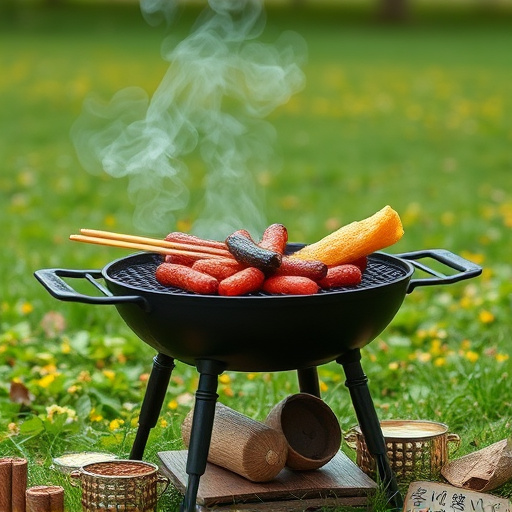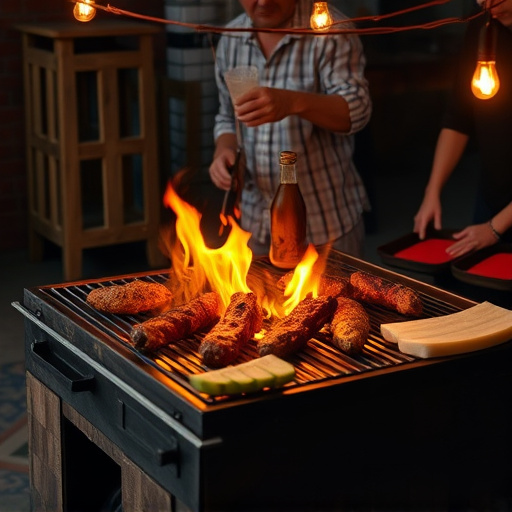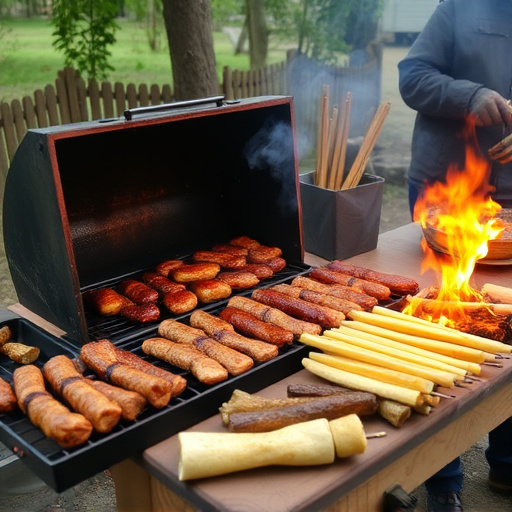To achieve a perfect BBQ Beef Brisket, start with a high-quality whole packer brisket, trim excess fat, and season generously. Preheat your grill to 225°F (107°C), cook slowly, and maintain temperature with a lid. Brush with BBQ sauce occasionally. Brine overnight for enhanced tenderness, then rub with coarse salt, pepper, smoked paprika, chili powder, cayenne, and dried onions. This meticulous process ensures tender, flavorful brisket ready to impress any crowd.
Unleash your inner BBQ master with the ultimate guide to grilling the perfect beef brisket. This step-by-step journey begins with selecting the best cut, guiding you through meticulous preparation techniques. Next, discover the art of grilling, where we unveil the secret to slow and even cooking. Finally, explore brining and seasoning methods that will transform your brisket into a mouthwatering masterpiece. Get ready to craft a BBQ Beef Brisket Recipe that’s sure to impress!
- Selecting and Preparing the Beef Brisket
- The Perfect Grilling Technique
- Brining and Seasoning for Maximum Flavor
Selecting and Preparing the Beef Brisket

When it comes to grilling a beef brisket that’s fit for a BBQ contest, selecting the right cut is half the battle won. Look for a whole packer brisket with good marbling—the flecks of fat throughout the meat—as this will ensure juicy, tender results. Aim for a size that fits comfortably on your grill grate; a 10-12 pounder is ideal for most home grills. Before cooking, trim excess fat to about a 1/4 inch layer, leaving enough to keep the brisket moist during the long cook. Some chefs prefer to score the fat cap diagonally to prevent it from burning and to promote even rendering during cooking.
Preparing your BBQ beef brisket involves more than just trimming. Seasoning is key—a good rub will cling to the meat, infusing flavor throughout. Use a generous amount of salt and pepper as a base, then add spices like garlic powder, paprika, onion powder, and cayenne for depth and heat (adjust according to your preference). Let the brisket come to room temperature before grilling; this ensures even cooking. For extra tenderness, consider soaking the meat in a brine solution overnight, though this step is optional.
The Perfect Grilling Technique

The perfect grilling technique for a mouthwatering BBQ Beef Brisket Recipe starts with preparation. The key is slow and even cooking, allowing the brisket to break down and become tender. Preheat your grill to indirect heat, aiming for around 225°F (107°C). This low and slow method ensures the brisket cooks evenly, locking in its natural juices. Place the meat on the grill, fat side up, and use a tight-fitting lid to create an oven-like environment.
As the brisket cooks, maintain a consistent temperature by adjusting your fuel source. Wood chips or chunks can add a delightful smoky flavor. Brush the meat occasionally with BBQ sauce for extra moisture and taste. The magic happens as hours pass, transforming tough brisket into tender, succulent slices. When it reaches an internal temperature of 165°F (74°C), it’s ready to be carved and enjoyed, offering a classic BBQ Beef Brisket Recipe that will impress any crowd.
Brining and Seasoning for Maximum Flavor

Brining is an often-overlooked step in grilling the perfect beef brisket, but it’s a game-changer for flavor. Before even thinking about fire and smoke, soaking your brisket in a briny solution can transform its taste and texture. This process helps break down tough connective tissues, making the final product incredibly tender. A good brine should consist of salt, water, and various spices like peppercorns, garlic, and herbs; some recipes even call for sugar or vinegar to enhance the flavor profile.
For a mouth-watering BBQ Beef Brisket Recipe, don’t skimp on seasoning. After brining, rub your brisket down with a generous blend of coarse salt and pepper. You can also use pre-made rubs or create your own mix with smoked paprika, chili powder, cayenne pepper, and dried onions for an extra smoky kick. These spices not only add flavor but also act as a barrier against overcooking, helping to keep the meat moist during the long grill session ahead.
